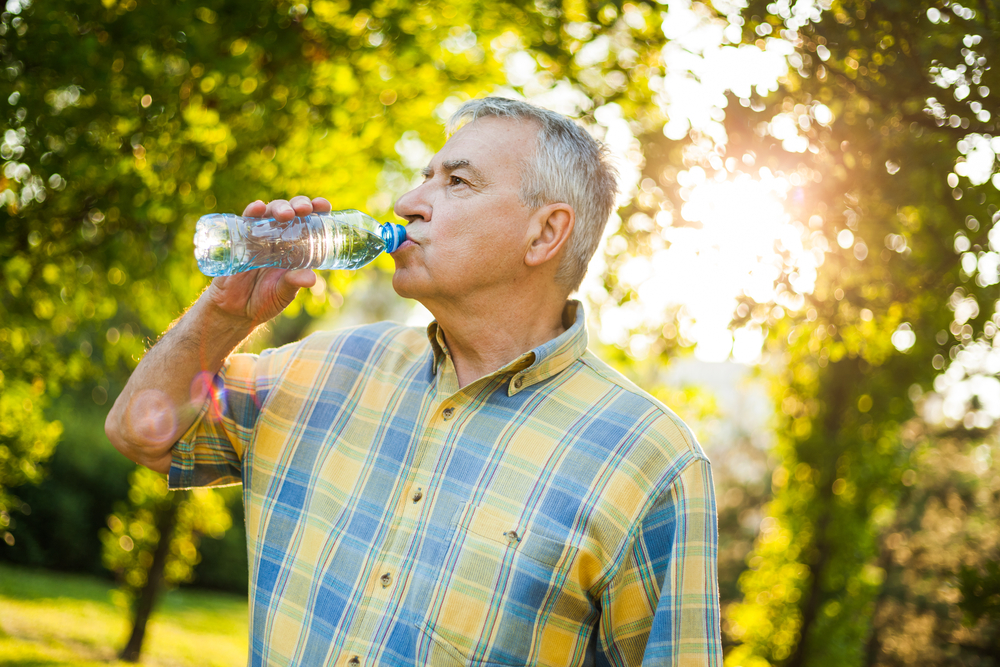 July 23, 2021
July 23, 2021
The summer weather is beautiful, but warmer temperatures and prolonged sun exposure can cause health concerns. This is especially true for older adults who are more at risk for heat-related health issues. Those with chronic health problems or on certain medications can also be at high risk for developing heart-related ailments.
How to Stay Cool When It’s Too Hot
When temperatures get to over 80°F, seniors need to stay proactive and take precautions to prevent health problems due to excessive heat. Remember the following tips when trying to keep cool in the summer.
- Stay Hydrated. As we age, our bodies don’t adjust the rate of sweat loss to prevent dehydration. Experts suggest drinking 1/2 oz to 1 oz of water per pound of body weight each day. Drinking cool water and clear juices are preferred. Liquids with alcohol or caffeine should be avoided.
- Avoid direct sun exposure. Being in direct sunlight makes the air feel 10 to 15 degrees warmer than it is. While the outside is the same temperature whether you’re in the sun or shade, the solar radiation makes it feel hotter and can cause heat-related illness faster.
- Dress lightly. When possible, wear loose, light-colored clothes. Dark colors tend to absorb heat and should be avoided. Wearing a lightweight, broad-brimmed hat can also help you stay cool and prevent sunburn.
- Apply sunscreen. A major risk factor for most skin cancers is too much direct sun exposure. Applying a broad-spectrum sunscreen to all exposed skin can help prevent sunburn and other ailments.
- Use air conditioning. Spend as much time as possible in air-conditioned spaces. If you don’t have an AC, go somewhere during the day that is temperature-controlled. For example, you can go to a local senior center, read a book at the library, or walk around a mall.
Spotting and Treating Heat-Related Illnesses
Symptoms of Heat Stroke
Heat stroke is a dangerous rise in body temperature. This can happen gradually over days of high heat exposure.
Warning Signs
- Body Temperature of 104°F (40°C) or higher
- Rapid breathing
- Racing and weak heart rate
- Headache
- Dizziness or confusion
- Flushed skin
- Nausea and vomiting
How to Take Action
Call 911 if you see these symptoms. Move to a cool place indoors or in the shade and loosen or remove heavy clothes. If you can, douse yourself in cool water and apply wet compresses like cloth to the wrists, ankles, armpits, and neck to lower body temperature. Try to drink cool liquids like water or sports drinks while waiting for emergency assistance to arrive.
Symptoms of Dehydration
Dehydration happens when you lose or use more fluid than you take in, and your body doesn’t have enough water to carry out normal functions.
Warning Signs
- Feeling thirsty
- Dizziness or lightheadedness
- Fatigue
- Dry mouth, lips, and eyes
- Urinating little and fewer than 4 times a day.
- Dark yellow, strong-smelling urine
How to Take Action
Drink plenty of water and, if possible, drinks with electrolytes like sports drinks. Electrolytes play a key role in regulating your heartbeat, and the body loses them when dehydrated. If you don’t feel better after drinking water, call 911. If you do feel better but have a chronic condition, you follow up with your healthcare provider.
Symptoms of Heat Exhaustion
Heat exhaustion is caused by too much heat and dehydration. If not treated, it can lead to heat stroke, mentioned above.
Warning Signs
- Body temperature between 98.6°F (37°C) and 104°F (40°C)
- Fatigue or weakness
- Cold, clammy skins
- Profuse sweating or no sweating
- Headache
- Nausea and vomiting
- Fast and weak pulse
How to Take Action
Immediately move to a cool, shady location and drink a lot of cool fluids like water or sports drinks. If you have high blood pressure or heart problems or don’t feel better quickly, call 911 right away.
Staying Proactive and Enjoying the Summer Season
For many, the summertime is a season to enjoy outdoor activities such as walking, gardening, and visiting safely. Staying in touch is one of the best ways to ensure seniors and loved ones are keeping safe this summer. Professional Caregivers can also be an asset when helping seniors enjoy the summer and outdoor activities while keeping special health considerations for seniors in mind.



